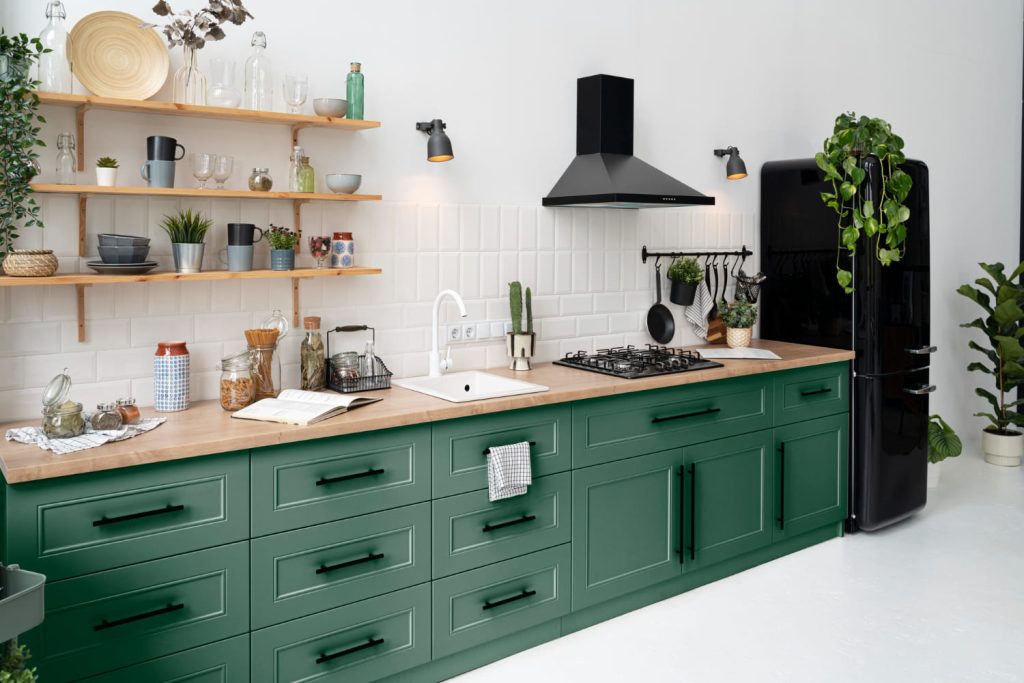Custom Kitchen Design: How Custom Kitchen Designs are Manufactured?

When it comes to home design, the kitchen is seen as the focal point of the house, and a custom kitchen design enhances this notion even more. A long process that goes beyond aesthetics yields a kitchen that is customized to your unique demands. More than locating big enough goods with adequate storage is needed to find the perfect kitchen layout planner substitutes for your space. Planning and comprehending organization and storage space principles is crucial, as well as following best practices while designing and building a custom kitchen design.
Understanding Custom Kitchen Design
Understanding the fundamentals of custom kitchen design is essential before diving into the manufacturing process. Instead of prefabricated kitchens, a custom-designed homebase kitchen planner considers each person’s tastes, lifestyle, and available space. This level of customization necessitates a thorough grasp of the homeowner’s preferences to ensure that the finished product is aesthetically pleasing and extremely useful.
Factors Influencing the Construction Timeline in Custom Kitchen Design
The time it takes to turn a kitchen layout planner from concept to reality depends on several things. A seamless and effective building process depends on recognizing and resolving these issues.
- Design Complexity
While sophisticated custom kitchen design are enticing, they take time. Design preparation, implementation, and coordination may take longer for elaborate layouts, intricate detailing, and distinctive features. Built-in illumination, concealed chambers, and delicate inlays demand accurate dimensions, careful planning, and extra work. As a general rule, more customization and complexity require more time. Building custom kitchens from scratch ensures they meet your needs. This process might take weeks, and adjustments during production or supply delays can quickly delay the project.
- Material Selection
The materials chosen significantly impact the timeliness and beauty of the custom kitchen. Obtaining uncommon or specially acquired materials could take longer, affecting the timeline for the building as a whole. The materials you decide on for your cabinets can significantly impact how quickly you rebuild your kitchen. The processing times for different materials vary. Plywood or laminate are good options if you need the project finished quickly.
- Budget Constraints
Budgetary restrictions can impact the complexity of the design and the materials used. Budget and ambition must be balanced for a custom homebase kitchen planner renovation to be successful without compromising quality. You may have to reconsider your initial intentions due to financial constraints. For instance, you may need to make material substitutions, which may entail rearranging, reselecting, or locating appropriate substitutes. Changes of this nature may have repercussions throughout the timeline.
- Permits and Regulations
Starting a custom kitchen design project involves picking fashionable components and imagining your ideal area. A crucial element frequently taking center stage is obtaining permits and following rules. Getting the required approvals is an essential and critical stage in the complicated world of building. By working within the parameters set by local authorities, this procedure involves ensuring that your project complies with safety standards, zoning laws, and other legal requirements.
The Custom Kitchen Design Process
The custom kitchen design process begins after the final design is decided upon and usually takes four to six weeks to complete. Several components that go into the overall design and functioning are carefully considered during this phase.
- Style and finish of furniture
In the kitchen, the entire atmosphere is determined by the selected furniture style and quality. The selection, which ranges from contemporary simplicity to traditional elegance, is based on the homeowner’s preferences and matches the whole design.
- Cabinetry and worktops
The selected furniture style and quality determine the kitchen’s atmosphere. The selection, which ranges from contemporary simplicity to traditional elegance, is based on the homeowner’s preferences and matches the whole design.
- Space and Storage
Custom kitchens in Leicester are known for their effective use of space. A kitchen can be aesthetically pleasing and functional by maximizing layout, accounting for workflow, and coming up with clever storage options. Apart from serving as the space for meal preparation, the kitchen is a prominent storage place for the family’s glasses, cookware, and dishes.
- Colour schemes
The color scheme, especially for the kitchen, dramatically impacts the atmosphere. A home-based kitchen planner may help create a customized color scheme that fits the homeowner’s tastes and style.
- Lighting
The thoughtful lighting design enhances the kitchen’s use and aesthetic appeal. It is crucial to carefully place ambient, task, and accent lighting in the right places for kitchens in Leicester for an area to be well-lit and welcoming.
- Appliances
The choice of equipment and its integration into the design of custom kitchens are carefully considered. When choosing high-end equipment, it’s essential to consider the appliances’ overall design and functionality.
The Custom Kitchen Build Process
After the design aspects are completed, the building phase starts. It entails a sequence of actions that turn the idea into a concrete reality. Because they require precise measurements and cuts, custom kitchens may take longer to construct by nature.
- Demolition and Preparation
The current kitchen fitters will need to be disassembled to create a place for the new design. It would free up space for the new design. The space will be readied for the succeeding installations that will take place at this stage of the process.
- Installation of Infrastructure
Establishing the foundation for essential services like plumbing, electricity, and other services is integral to the infrastructure installation process. The foundation set during this step is the basis upon which the functional components of the home base kitchen planner are constructed.
- Cabinet and Countertop Installation
Cabinetry and countertops that were painstakingly built during the design phase are then installed with high accuracy. Paying close attention to detail guarantees impeccable kitchen fitters and a polished finish.
- Appliance Installation
To ensure that the chosen appliances are in harmony with the overall aesthetic and contribute to the usefulness of the space, they are included in the design of the kitchens..
- Finishing Touches
The custom kitchens come to life with the addition of finishing touches. It encompasses the application of paint, the installation of hardware, and any extra decorative features that contribute to overall aesthetic appeal of the area.
Conclusion
Using a kitchen layout planner and kitchen fitters to create a custom kitchen design is a sophisticated and multifaceted process that can turn an idea into a one-of-a-kind haven in your home. Anyone embarking on this rewarding undertaking needs to have a solid grasp of the factors influencing the construction schedule and respect for the entire process from design to completion. A homebase kitchen planner can create a kitchen that precisely fits your vision, reflects your style, and maximizes the use of your living space by devoting time and effort to the first stages of the project.

